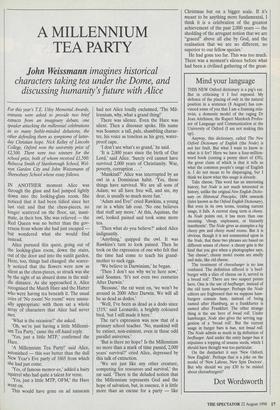Mind your language
THIS NEW Oxford dictionary is a pig's ear. But in criticising it I feel exposed. My defence of the placing of only in the natural position in a sentence (8 August) has con- vinced some of you that I am a foaming rela- tivist, a domestic model of the raging Dr Jean Aitchison, the Rupert Murdoch Profes- sor of Language and Communication at the University of Oxford (I am not making this up).
Anyway, this dictionary, called The New Oxford Dictionary of English (the Node) is not her fault. But what I want to know is: what is it for? Here we have a four-million- word book (costing a penny short of f30), the great claim of which is that it tells us what the common people's usage of English is. I do not mean to be disparaging, but I think we know what this usage is already.
Take cheese. This word has an interesting history, but Node is not much interested in history, unlike the original New English Dictio- nary on Historical Principles, 1884 onwards (later known as the Oxford English Dictionary). But even in its own terms, treating current usage, it fails. A current slang term is cheesy. As Node points out, it has more than one meaning: 'cheap, unpleasant, or blatantly inauthentic'. The Node gives as examples a big cheesy grin and cheesy motel moms. But it is obvious, though it is not commented upon in the Node, that these two phrases are based on different senses of cheese: a cheesy grin is the kind that you give when a photographer says, `Say cheese'; cheesy motel rooms are smelly and stale, like old cheese.
The treatment of cheeseburger is no less confused. The definition offered is 'a beef- burger with a slice of cheese on it, served in a bread roll'. There are two suspect points here. One is the use of beefburger, instead of the old term hamburger. Perhaps the Node editors are frightened that we suppose ham- burgers contain ham, instead of being named after Hamburg, as a frankfurter is named after Frankfurt. The other strange thing is the use here of bread roll. Under hamburger, Node also gives the serving sug- gestion of a 'bread roll'. But the current usage in burger bars is bun, not bread roll. The Node admits as much in its definition of beefburger. And under the entry burger bun it stipulates a topping of sesame seeds, which I should have thought was too particular.
On the dustjacket it says 'New Oxford, • New English'. Perhaps that is a joke on the model of 'New Labour, New Spin Doctors'. But why should we pay f.30 to be misled about cheeseburgers?
Dot Wordsworth
























































 Previous page
Previous page